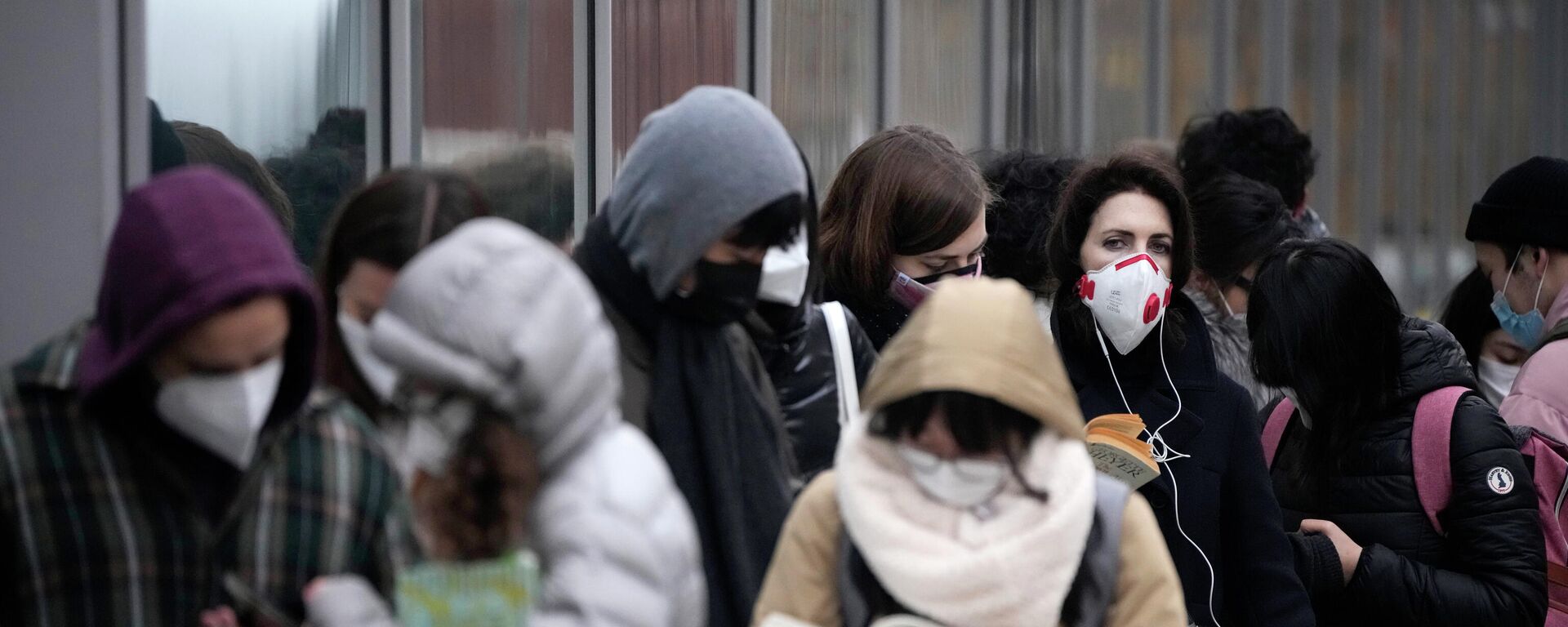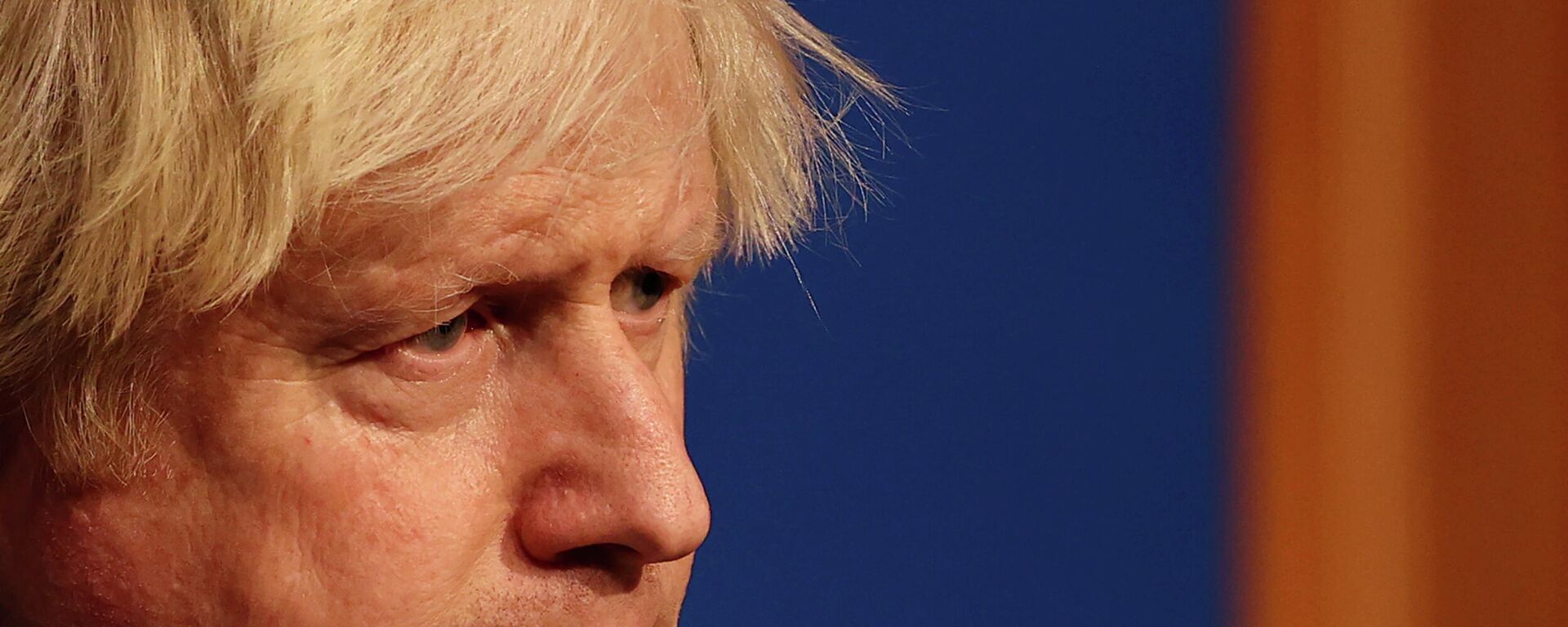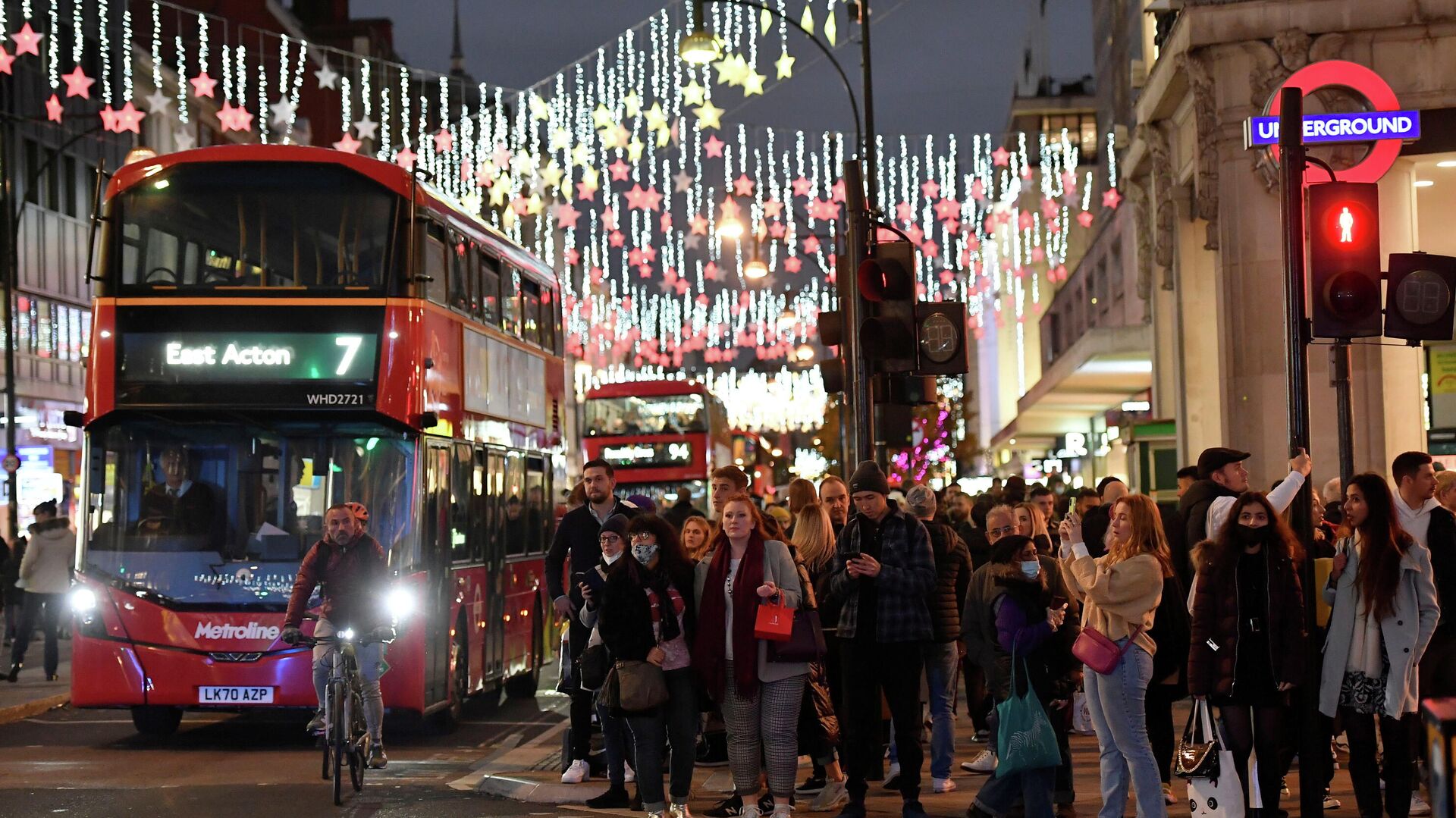https://sputnikglobe.com/20211225/uk-to-mull-new-covid-19-restrictions-in-scientifically-modelled-scenarios-1091790870.html
UK 'to Mull New COVID-19 Restrictions in Scientifically-Modelled Scenarios'
UK 'to Mull New COVID-19 Restrictions in Scientifically-Modelled Scenarios'
Sputnik International
The possibility of introducing new restrictions to curb the spread of the coronavirus could be considered by UK ministers as early as Monday, according to The Guardian.
2021-12-25T10:23+0000
2021-12-25T10:23+0000
2023-05-28T15:17+0000
omicron covid strain
boris johnson
covid-19
omicron strain
united kingdom (uk)
https://cdn1.img.sputnikglobe.com/img/07e5/0c/0a/1091412935_0:380:2964:2047_1920x0_80_0_0_2aad468a49f31ed5fcb9409ae6373cc4.jpg
The possibility of introducing new restrictions to curb the spread of the coronavirus could be considered by UK ministers as early as Monday, according to The Guardian.Amid a rapid surge in COVID-19 cases and with the new Omicron strain of the virus increasingly manifest across England, ministers will reportedly gather to assess several scenarios modelled for government scientists by the University of Warwick.Documents published by the Scientific Pandemic Influenza Group on Modelling (Spi-M), a government advisory group acting alongside the Scientific Advisory Group for Emergencies (Sage), was published online on 24 December.The papers referenced modelling conducted by the University of Warwick, which had been made public separately, and included scenarios of a return to Step 2 restrictions on several suggested timelines.Overall, the experts had assembled a total of 13 scenarios, based on estimates of four different levels of severity of the Omicron strain of the virus.According to Downing Street sources cited by UK media outlets, the modelling data has not been submitted to government ministers yet for consideration.Any potential changes in pandemic-induced restrictions could come into effect after Prime Minister Boris Johnson and his Cabinet agree on the preferred course of action, with Parliament voting the changes through.Back to ‘Step 2’?Step 2, that is referenced in the modelling, includes a ban on indoor social mixing, and a return of the “rule of six,” when outdoor socialising was only allowed to groups of up to six people. Bars and restaurants were limited to serving customers outdoors.The measures had been an inherent part of the UK government’s roadmap out of lockdown in the first half of 2021. Working from home was encouraged, and hotels and hostels closed.The new modelling considered the impact of adopting the new rules, for example, on 28 December and on 1 January. It then looked into a return to Plan B restrictions - currently in place across England, on 15 January, 28 January, or 28 March.The Warwick scientific team had based estimates on an assumption that the Omicron variant was half as likely to cause severe disease as Delta. According to the experts, the sooner the restrictions were introduced and the longer they lasted, the biggest impact they were predicted to have on reducing hospital admissions and deaths.Accordingly, if Step 2 restrictions remained until 28 March the number of deaths could be more than a third lower than if Plan B were to stay in force.If enforced between 28 December and 15 January, according to the modelling, there might be a lowering of the death toll by just 18%.The current Plan B for dealing with COVID-19 infections this winter involves mandatory introduction of health passes - proof of double-vaccination or a recent negative test - to enter nightclubs, big sports matches and other large events.Introducing the measures had resulted in PM Boris Johnson battling the largest parliamentary rebellion of his premiership on 14 December, with 99 of his MPs opposing him. The plan was voted through on the support of Labour Party votes.Johnson has since baulked at taking any more unpopular decisions, despite Sage urging him to reintroduce “more stringent measures … very soon”, according to the minutes of its meeting on 16 December.In response, a group of cabinet ministers argued more data on the impact of the Omicron strain on hospitalisations and vaccines was needed.This comes as around 1.7 million people in the UK are believed to have been infected with COVID-19 from 13-19 December - the highest number of infections during the pandemic, according to the Office for National Statistics (ONS). The Omicron variant is responsible for the exceptionally rapid spread of the disease, it was added.
https://sputnikglobe.com/20211224/record-17-million-people-in-uk-tested-positive-for-covid-19-last-week-1091779515.html
https://sputnikglobe.com/20211220/pm-johnson-reportedly-warned-of-no-confidence-vote-if-measures-to-tackle-omicron-introduced-1091660425.html
united kingdom (uk)
Sputnik International
feedback@sputniknews.com
+74956456601
MIA „Rosiya Segodnya“
2021
News
en_EN
Sputnik International
feedback@sputniknews.com
+74956456601
MIA „Rosiya Segodnya“
Sputnik International
feedback@sputniknews.com
+74956456601
MIA „Rosiya Segodnya“
covid-19 omicron boris johnson
covid-19 omicron boris johnson
UK 'to Mull New COVID-19 Restrictions in Scientifically-Modelled Scenarios'
10:23 GMT 25.12.2021 (Updated: 15:17 GMT 28.05.2023) 1,544,600 people in England tested positive for COVID-19 last week, with the surge in infections affecting all age groups and the Omicron variant also increasingly registered across England.
The possibility of introducing new restrictions to curb the spread of the coronavirus could be considered by UK ministers as early as Monday, according to The Guardian.
Amid a rapid surge in COVID-19 cases and with the new Omicron strain of the virus increasingly manifest across England, ministers will reportedly gather to assess several scenarios modelled for government scientists by the
University of Warwick.
Documents published by the Scientific Pandemic Influenza Group on Modelling (Spi-M), a government advisory group acting alongside the Scientific Advisory Group for Emergencies (Sage), was published online on 24 December.
The papers referenced modelling conducted by the University of Warwick, which had been made public separately, and included scenarios of a return to Step 2 restrictions on several suggested timelines.
Overall, the experts had assembled a total of 13 scenarios, based on estimates of four different levels of severity of the
Omicron strain of the virus.
According to Downing Street sources cited by UK media outlets, the modelling data has not been submitted to government ministers yet for consideration.

24 December 2021, 14:42 GMT
Any potential changes in pandemic-induced restrictions could come into effect after Prime Minister Boris Johnson and his Cabinet agree on the preferred course of action, with Parliament voting the changes through.
Step 2, that is referenced in the modelling, includes a ban on indoor social mixing, and a return of the “rule of six,” when outdoor socialising was only allowed to groups of up to six people. Bars and restaurants were limited to serving customers outdoors.
The measures had been an inherent part of the UK government’s
roadmap out of lockdown in the first half of 2021. Working from home was encouraged, and hotels and hostels closed.
The new modelling considered the impact of adopting the new rules, for example, on 28 December and on 1 January. It then looked into a return to Plan B restrictions - currently in place across England, on 15 January, 28 January, or 28 March.
The Warwick scientific team had based estimates on an assumption that the Omicron variant was half as likely to cause severe disease as Delta. According to the experts, the sooner the restrictions were introduced and the longer they lasted, the biggest impact they were predicted to have on reducing hospital admissions and deaths.
Accordingly, if Step 2 restrictions remained until 28 March the number of deaths could be more than a third lower than if Plan B were to stay in force.
If enforced between 28 December and 15 January, according to the modelling, there might be a lowering of the death toll by just 18%.
“In all the scenarios modelled, rapidly enacted Step 2 measures reduce the peak of hospital pressure to about half its level under Plan B only,” stated the University of Warwick team.
The current Plan B for dealing with COVID-19 infections this winter involves mandatory introduction of health passes - proof of double-vaccination or a recent negative test - to enter nightclubs, big sports matches and other large events.
Introducing the measures had resulted in PM Boris Johnson battling the largest parliamentary rebellion of his premiership on 14 December, with 99 of his MPs opposing him. The plan was voted through on the support of Labour Party votes.

20 December 2021, 08:34 GMT
Johnson
has since baulked at taking any more unpopular decisions, despite Sage urging him to reintroduce “more stringent measures … very soon”, according to the minutes of its meeting on 16 December.
“The timing of such measures is crucial. Delaying until 2022 would greatly reduce the effectiveness of such interventions and make it less likely that these would prevent considerable pressure on health and care settings,” the Scientific Advisory Group for Emergencies had insisted.
In response, a group of cabinet ministers
argued more data on the impact of the Omicron strain on hospitalisations and vaccines was needed.
This comes as around 1.7 million people in the UK are believed to have been infected with COVID-19 from 13-19 December - the highest number of infections during the pandemic, according to the Office for National Statistics (ONS). The Omicron variant is responsible for the exceptionally rapid spread of the disease, it was added.






